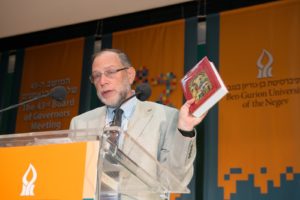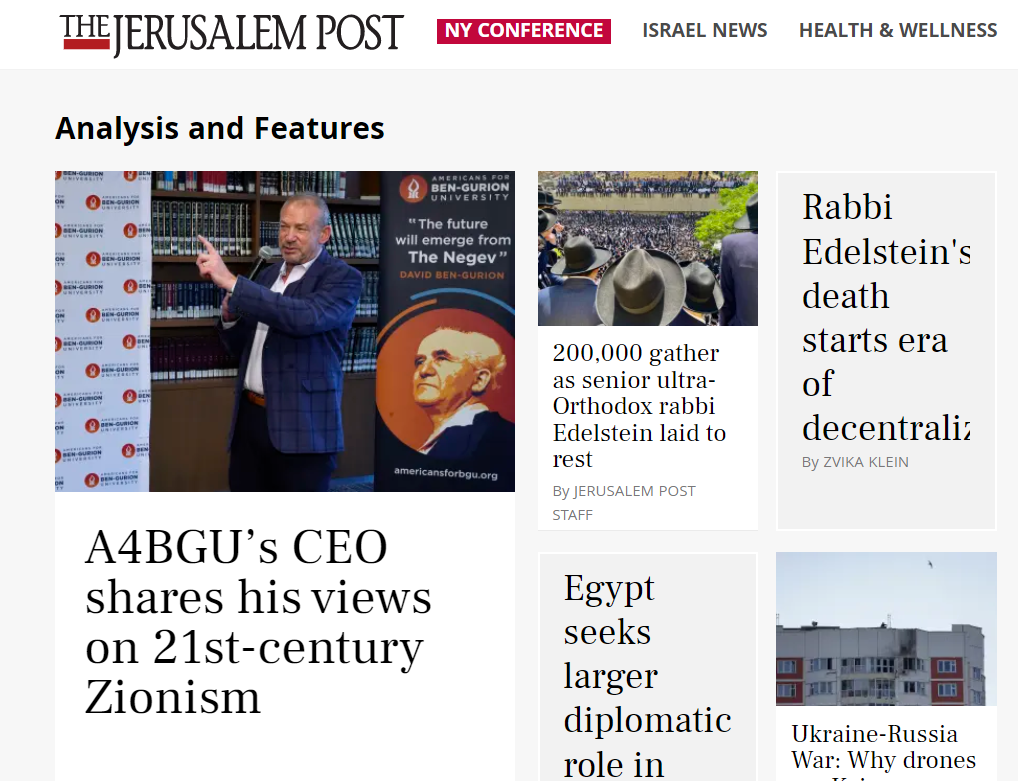
Goldstein-Goren Prize for Best Jewish Thought Book
Goldstein-Goren Prize for Best Jewish Thought Book
May 14, 2013
Israel Studies, Culture & Jewish Thought, Press Releases
 The Goldstein-Goren International Center for Jewish Thought at Ben-Gurion University of the Negev (BGU) awarded The Goldstein-Goren International Prize for the Most Important Book in Jewish Thought to two authors last week.
The Goldstein-Goren International Center for Jewish Thought at Ben-Gurion University of the Negev (BGU) awarded The Goldstein-Goren International Prize for the Most Important Book in Jewish Thought to two authors last week.
The prize of $30,000 will be shared by Ephraim Kanarfogel for The Intellectual History and Rabbinic Culture of Medieval Ashkenaz(Wayne State University Press) and Roni Weinstein for Break the Vessels: Kabbalah and Jewish Modernity (Tel Aviv University Press).
The center offers an award every three years for the best book in the field of Jewish thought published either in English or Hebrew. This award, covering books published between 2010 and 2012, marks the fifth one to be presented since the prize was established.
“I was very pleasantly surprised by this year’s competition, for we had a record number of submissions, over 80 in both Hebrew and in English, most of them of exceptionally high quality,” said Prof. Haim Kreisel, chair of the Goldstein-Goren International Center for Jewish Thought, who announced the prize recipients at the opening plenary of BGU’s 43rd Annual Board of Governors Meeting in Beer-Sheva.
“Both winners blaze new trails in the study of Jewish thought, yet in many ways they reflect conflicting currents that characterize the field,” Kreisel explained.
“One book was written in English, the other in Hebrew, one is much more anchored in traditional forms of scholarship and presents the definitive study, at least for the time being, of the area which the author researched (the English book), while the other book is interested in developing an entirely new way of looking at an area while raising new questions,” he said.
The blue ribbon panel that judged the books consisted of three internationally recognized experts in the field: Prof. Larry Kaplan from McGill University, Prof. Ada Rapoport Albert from the University of London and BGU’s own Israel Prize laureate Prof. Gerald Blidstein who served as chair of the competition.
Regarding The Intellectual History and Rabbinic Culture of Medieval Ashkenaz, the judges wrote: Ephraim Kanarfogel’s book is an unusual, exceptionally thorough and learned treatment of the full range of tosafist [medieval commentaries on the Talmud] intellectual activity, laying down the claim that the tosafists are not to be read as legists or even as Talmudists alone, but are rather best appreciated with a view to their broader intellectual and cultural activity — as Biblical exegetes and even philosophers. Kanarfogel’s work will become a standard reference in the field.
In regard to Break the Vessels: Kabbalah and Jewish Modernity, the judges wrote: Roni Weinstein challenges the common assumption that the kabbalistic worldview owes its popularity to its theological and metaphysical content. Rather, he argues, the social context of kabbalistic thought is at least as significant. Weinstein has written an exciting and groundbreaking book which raises important new questions. If he is correct, his book is a landmark breakthrough.
The fifth Goldstein-Goren Prize was presented in the presence of Alex Goren, BGU’s board chair and former president of American Associates, Ben-Gurion University of the Negev, and his sister, Micaela Goren-Monti. Their late father, Avram Goldstein-Goren, established the Goldstein-Goren International Center for Jewish Thought at BGU shortly after reaching his 100th birthday.
“Avram was a proud Jew in the best sense of the word. He was committed to disseminating an appreciation of Jewish tradition to the outside world, that is to say, he was interested in fostering a critical appreciation of the contribution of Jewish tradition to world civilization, as well as to Jewish survival,” Kreisel said.
ABOUT AMERICANS FOR BEN-GURION UNIVERSITY
By supporting a world-class academic institution that not only nurtures the Negev, but also shares its expertise locally and globally, Americans for Ben-Gurion University engages a community of Americans who are committed to improving the world. David Ben-Gurion envisioned that Israel’s future would be forged in the Negev. The cutting-edge research carried out at Ben-Gurion University drives that vision by sustaining a desert Silicon Valley, with the “Stanford of the Negev” at its center. The Americans for Ben-Gurion University movement supports a 21st century unifying vision for Israel by rallying around BGU’s remarkable work and role as an apolitical beacon of light in the Negev desert.
About Ben-Gurion University of the Negev
Ben-Gurion University of the Negev embraces the endless potential we have as individuals and as a commonality to adapt and to thrive in changing environments. Inspired by our location in the desert, we aim to discover, to create, and to develop solutions to dynamic challenges, to pose questions that have yet to be asked, and to push beyond the boundaries of the commonly accepted and possible.
We are proud to be a central force for inclusion, diversity and innovation in Israel, and we strive to extend the Negev’s potential and our entrepreneurial spirit throughout the world. For example, the multi-disciplinary School for Sustainability and Climate Change at BGU leverages over 50 years of expertise on living and thriving in the desert into scalable solutions for people everywhere.
BGU at a glance:
20,000 students | 800 senior faculty | 3 campuses | 6 faculties: humanities & social sciences, health sciences, engineering sciences, natural sciences, business & management, and desert research.
For all press inquiries, please contact:
James Fattal, J Cubed Communications
516.289.1496



